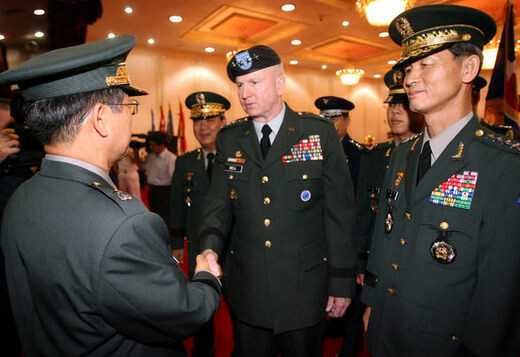hankyoreh
Links to other country sites 다른 나라 사이트 링크
U.S. made S.K. soldiers memorize history of Japanese collaborator

Some South Korean soldiers assigned to serve with the U.S. army here have been forced to recite memorized passages from a biography of Paik Sun-yup, which say that he devoted his early life to freeing Korea from Japanese rule. While Paik was decorated as a war hero, he is considered by modern historians as a collaborator with Japan during the colonial period.
A Korean Augmentation to the U.S. Army - or ’Katusa’ - told The Hankyoreh that the eighth U.S. army has held the so-called Paik Sun-yup Board, named after the nation’s first army general, four times a year for the past four years. At the contest, participants compete with each other in their level of knowledge about Paik.
Participants had to recite an English-language version of a biography of Paik, which states that he devoted his life to the nation’s independence from Japan’s colonial rule. But the widely-held belief by historians is that Paik was not an independence activist, instead serving as an instructor at a military academy established by Japan to clamp down on South Korean pro-independence activists between 1942 and 1945.
The author of the biographical passage was unknown.
Last August, Paik was listed as a pro-Japanese collaborator by the Institute for Research of Collaborationist Activities. "Although Paik went to Pyongyang in September 1945 and worked at the secretarial office of [independence activist] Cho Man-sik after the military was disbanded, it is a fraud to say that he was an independence activist," Park Han-yong, a researcher at the institute, said.
A Katusa, identified by his surname Choi, who had been awarded at the contest few years back, said that "most of the Koreans serving as Katusas knew of [Paik] as a collaborator with the Japanese colonial regime. And we were reluctant to participate in the event. But we did not have any options; as servicemen, we have to obey orders from above."
It was not known whether U.S. Army officials knew about Paik’s past during the Japanese colonial regime, nor whether any of the Katusa had brought the issue to their attention.
After the Korean war, Paik was the recipient of two Taeguk Medals, Korea’s equivalent to the U.S. Congressional Medal of Honor, as well as four Legions of Merit awards as well as the Silver Star from the U.S.; in 2002, the U.S. dedicated the "General Paik Hero Room," a special training facility for the Second Infantry Division.
The U.S Eighth Army did not reply to the Hankyoreh’s request for comment.
Pyo Myung-ryeol, head of a Korean War veteran’s group, said that "it is sad to see young soldiers be forced to memorize such a distorted biography of Paik."
Asked to comment on the contest, Paik’s aides said that they did not know the details of the biography, adding that the competition had been held at the request of the U.S. Army and not by their office.
Editorial・opinion
![[Column] Has Korea, too, crossed the Rubicon on China? [Column] Has Korea, too, crossed the Rubicon on China?](https://flexible.img.hani.co.kr/flexible/normal/500/300/imgdb/original/2024/0419/9317135153409185.jpg) [Column] Has Korea, too, crossed the Rubicon on China?
[Column] Has Korea, too, crossed the Rubicon on China?![[Correspondent’s column] In Japan’s alliance with US, echoes of its past alliances with UK [Correspondent’s column] In Japan’s alliance with US, echoes of its past alliances with UK](https://flexible.img.hani.co.kr/flexible/normal/500/300/imgdb/original/2024/0419/2317135166563519.jpg) [Correspondent’s column] In Japan’s alliance with US, echoes of its past alliances with UK
[Correspondent’s column] In Japan’s alliance with US, echoes of its past alliances with UK- [Editorial] Does Yoon think the Korean public is wrong?
- [Editorial] As it bolsters its alliance with US, Japan must be accountable for past
- [Guest essay] Amending the Constitution is Yoon’s key to leaving office in public’s good graces
- [Editorial] 10 years on, lessons of Sewol tragedy must never be forgotten
- [Column] A death blow to Korea’s prosecutor politics
- [Correspondent’s column] The US and the end of Japanese pacifism
- [Guest essay] How Korea turned its trainee doctors into monsters
- [Guest essay] As someone who helped forge Seoul-Moscow ties, their status today troubles me
Most viewed articles
- 1[Column] The clock is ticking for Korea’s first lady
- 2Samsung barricades office as unionized workers strike for better conditions
- 3After 2 months of delayed, denied medical care, Koreans worry worst may be yet to come
- 4[Correspondent’s column] In Japan’s alliance with US, echoes of its past alliances with UK
- 5[Column] Has Korea, too, crossed the Rubicon on China?
- 6Hong Se-hwa, voice for tolerance whose memoir of exile touched a chord, dies at 76
- 7[Photo] Smile ambassador, you’re on camera
- 8All eyes on Xiaomi after it pulls off EV that Apple couldn’t
- 9[Guest essay] How Korea turned its trainee doctors into monsters
- 10US overtakes China as Korea’s top export market, prompting trade sanction jitters